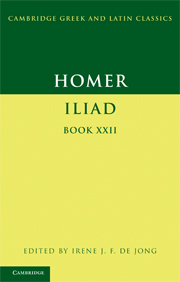Introduction
Published online by Cambridge University Press: 05 June 2012
Summary
Homer
The life and times of the poet who created the Homeric epics are shrouded in mystery, as they have been since antiquity. He himself is partly to blame for this, in that he never mentions his name or gives any other personal information.The name Homer at some point in the seventh or sixth century bc came to be connected to the poems that are called Iliad and Odyssey (the titles are found for the first time we know of in Herodotus Histories 2.116), and more than one place in Ionia, most prominently Smyrna and Chios, claimed Homer as its native son. He was supposed to have lived at any time between the fall of Troy (traditionally placed in the twelfth century bc) and the seventh century. Some Lives of Homer are known from Roman imperial times, but they are worthless as historical sources because they are largely composed out of elements taken from the poems themselves (the boy Homer is taught by Phemius, a name suspiciously similar to that of the singer in Odysseus’ palace, and travels together with someone called Mentes, recalling Odysseus’ old friend and advisor of Telemachus, etc.). More than once it has even been suggested that Homer never existed; a recent proponent of this view argues that he was the creation of a group of professional performers called ‘the descendants of Homer (Homeridai)’, who thus endowed themselves with a mythical forefather. The name Homer, not common in Greek, would be their reinterpretation of the designation ὁμηρίδαι, which originally referred to professionals singing at a *ὅμαρος, ‘assembly of the people’. Conversely, some think there may have been two ‘Homers’, one composing the Iliad, the other the Odyssey.
Modern scholarship concurs with antiquity in placing Homer in Ionia, on account of the predominance of Ionian forms in his language; however, his dates remain contested. Can archaeology perhaps be of help? Here we must distinguish between the world created by Homer in his poems and the world in which Homer himself lived. As for the first, modern opinions vary between considering the setting of the Homeric epics by and large Mycenaean (1600–1200 bc), ‘dark age’ (1200–900 bc), eighth- or early seventh-century, or an amalgam.
- Type
- Chapter
- Information
- Homer: Iliad Book 22 , pp. 1 - 40Publisher: Cambridge University PressPrint publication year: 2012

